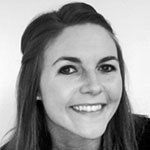Katherine LaGrave
Katherine LaGrave (MSJ11)
Deputy Editor of Features at Afar Media

Why did you choose Medill?
I was initially interested in Medill because of its program structure. I also liked its emphasis on reporting, loved the course offerings and saw where its alumni had ended up.
What is your fondest memory of your time at Medill?
Aside from making friends for life, it would have to be learning to develop well-reported features or the weeks spent working on my capstone project. For that quarter, I and a dozen others worked on something I believed in to create a product from scratch. It was a travel magazine for students studying abroad, and we wrote, commissioned, edited, designed and built it from the ground up.
What was the greatest challenge you faced during your Medill career?
Probably an on-air performance class. When I was signing up for classes, I decided to do something way outside my comfort zone. I had a flash of panic once I got to class and it was filled with students looking to work on television. That kind of helped me raise my game a little bit, though, and I had a professor who didn't care whether we were there for a concentration or as an elective and would never want to appear on television at all. We were all held to the same standards.
Why do you think Medill is unique?
Its combination of teaching and action. Everything we were taught, we were asked to get out and prove that we learned it. There are written exams and projects, sure, but the courses are definitely hands-on in a way that prepares you to walk into a newsroom and not be intimidated. We are taught not that we're becoming journalists, but that we are journalists. That expectation of excellence is reinforced constantly.
What was your greatest achievement or best experience?
During Methods, my reporting neighborhood was Rogers Park, and my beat was senior citizens, not my first choice, but instead of being unhappy, I decided to embrace it. I walked the neighborhood to familiarize myself, noting streets and storefronts, and introducing myself to as many people as I could. On one of these walks, I went into a barbershop where I met Ben, who became the subject of my Methods feature. A nonagenarian who was still snipping, shaving, trimming and buzzing his fleet of loyal customers, Ben was a barber from Poland who had survived Auschwitz and Mauthausen concentration camps by cutting hair. I went back to sit with him as he worked, Saturday after Saturday, and just listened. It was my first real lesson that everyone has a story, and that listening is the most important part of that. It's undoubtedly my favorite work from my time at Medill, and probably my career. Ben just retired last year at age 96.
How has your Medill training helped you in your career so far? Are there skills or lessons you learned at Medill that you still use today?
Absolutely. Most important, I think, Medill taught me how to report. How to do all of the small things right—fact-checking a story, finding a source, navigating off-the-record conversations. (I still think of the oft-referenced "If your mother says she loves you, check it out" sign hanging in the newsroom.) Working with freelancers now, I know that building a concrete story is a skill that not everyone has, or has learned.
What advice do you have for someone who might be looking to pursue a degree in journalism?
Don't be afraid to initially cast your net wide and to sample classes that intimidate you. They'll probably make you a better journalist. I'd also suggest getting really comfortable with deadlines and details. The hard work is only just beginning when you get to school—there's a lifetime of it ahead!—but Medill offers a solid starting block.
How have you tapped into the Medill network in your career?
I first connected with a Medill contact about an open job at Vanity Fair, where I worked prior to Traveler. Once at VF, I networked in the building and across magazines (VF and Traveler are owned by the same publishing company) and this led to my establishing relationships with editors at other publications. When a job at Traveler that I was interested in came open, I was already a familiar face. I still try to go to networking events and learn more about fellow alums. You never know when a connection will come in handy.

